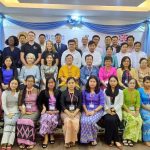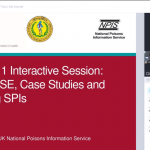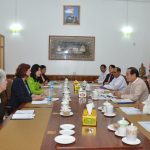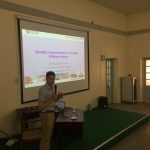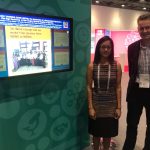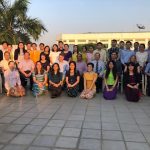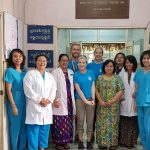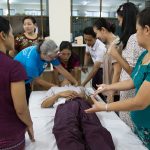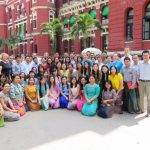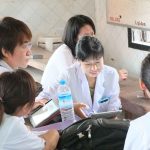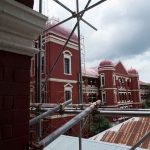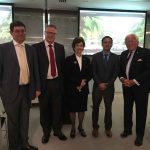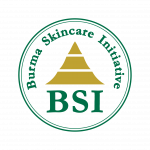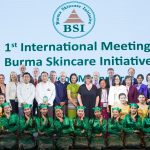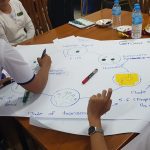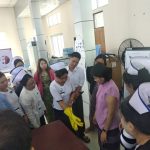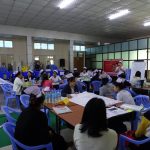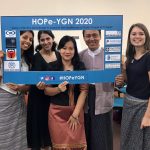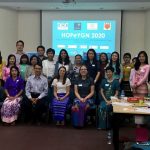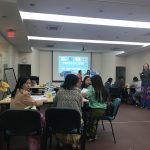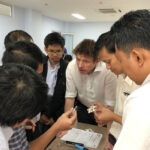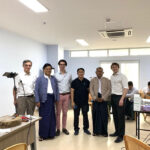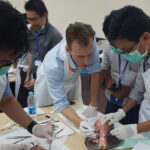- (1) Public Health England
- (2) Royal College of Physicians
- (3) Cambridge Global Health Partnership (CGHP)
- (4) Better Health Program
- (5) Rangoon General Hospital Reinvigoration Charitable Trust (RGHR)
- (6) Burma Skincare Initiative
- (7) WASH program
- (8) HOPe-YGN: a systems approach
- (9) The Global Health Research Group on Neurotrauma (GHRGN)
- (10) The British Society of Surgery to the Hand (BSSH)
- (11) Diaspora led UK based Charities for Healthcare Improvements
PHE’s IHR Strengthening Project
Global health is an important part of PHE’s core business. We act internationally to strengthen global health security, protect the health of the UK’s population and improve health inequalities. PHE coordinates a number of projects in countries across the world as part of its global health remit, including the International Health Regulations (IHR) Strengthening Project.
The IHR Strengthening Project, funded by the UK Department of Health and Social Care Official Development Assistance (ODA), is contributing to efforts to enhance global health security by working in partnership with national public health institutions in six focal countries (Myanmar, Ethiopia, Nigeria, Pakistan, Sierra Leone and Zambia) to strengthen their compliance with IHR. Our project also involves working with regional public health bodies, including WHO regions (Regional Office for Africa, Eastern Mediterranean Regional Office, South-East Asia Regional Office) and the Africa Centre for Disease Control and Prevention (Africa CDC).
Our work in Myanmar
We have been collaborating with the Myanmar Ministry of Health and Sports (MoHS) since 2017. Our partnership has been driven by priorities outlined in the country’s Joint External Evaluation findings (May 2017), National Action Plan for Health Security (launched September 2017). Our work in Myanmar so far has focussed on providing technical assistance on:
- Emergency preparedness and resilience and response – through strengthening emergency response plans, facilitation of emergency simulation exercises, incident manager training and after-action reviews.
- Laboratory, disease surveillance & epidemiology strengthening– through reviews of national health laboratory and communicable disease surveillance capacities and provision of mentoring and support on laboratory quality management systems,
- Management of chemical and poisons hazards- through strengtheningpoison detection and surveillance, clinical toxicology capacity and enhancing chemical event response and recovery capacity through delivery of After Action Reviews to chemical events, in partnership with the National Poisons Control Centre.
- One Health – technical contribution to the development of Myanmar’s National One Health Strategic Framework and Action Plan, including key technical contribution to the IHR Performance of Veterinary Services (PVS) workshops.
For more information on the IHR Strengthening Project please visit our page on the UK Government Development Tracker https://devtracker.fcdo.gov.uk/projects/GB-GOV-10-IHR-PHE, or contact IHR.programme@phe.gov.uk
Royal College of Physicians
The Royal College of Physicians (RCP) is a global membership organisation with members and fellows based in more than 80 different countries. There is a long history within Myanmar of trainee physicians completing the MRCP(UK) examinations as part of their postgraduate training and also of senior physicians being elected to Fellowship of the RCP. The RCP is represented within Myanmar by our International Advisor, currently Professor Zaw Lynn Aung who acts as an important point of contact between the College and member and fellows within Myanmar.
Since 2015 the RCP in collaboration with our fellow Royal Colleges from Edinburgh and Glasgow have been committed to more intensive support for trainee physicians in Myanmar and have been delivering bespoke Communication Skills training courses with a particular focus on those skills important both for success in the MRCP PACES exam but also of value throughout a career in hospital medicine. The courses have been delivered with a combined UK and Myanmar faculty in both Yangon and Mandalay and have received very positive feedback. In addition the team have taken the opportunity to deliver CPD sessions for the wider Myanmar medical community.
The RCP has established good working relationships with other medical organisations within Myanmar and has regularly contributed to the Myanmar Medical Association conference. More recently in early 2020 the RCP supported the launch of a joint UK-Myanmar venture, the Burma Skincare Initiation which aims to strengthen the provision of dermatology services within Myanmar.
The Medical Training Initiative (MTI) is a scheme set up to allow doctors from elsewhere in the world to take up a fixed term training opportunity using spare training capacity within the NHS. The RCP scheme is the largest of all UK college programmes with approximately 300 international medical graduates currently receiving training within the UK. Doctors from Myanmar have been well represented historically and interviews for the MTI scheme are always built into the program for RCP visits to Myanmar with the most recent appointments made in February 2020 after interviews at UM-1 in Yangon.
Quality Improvement (QI) is an important RCP activity supported by a dedicated RCP team, RCPQI. In collaboration with the Brighter Future Foundation and Health Education England (HEE) the RCP has supported and supervised QI projects within Myanmar and in 2019 the Clinical Director for Quality Improvement and Patient Safety, Dr John Dean delivered a QI workshop at UM-1.
Finally, it would not be possible to ignore the impact of the Covid 19 pandemic across the globe and the RCP Global team has been working hard to stay in touch with our friends and colleagues in Myanmar despite the ongoing travel restrictions. In the summer we hosted a global webinair exploring the early impact of the pandemic in Myanmar and we continue to offer a broad portfolio of online learning through our streaming service RCP Player. A current series of webinairs produced in collaboration with partners in Malaysia is specifically targeted at the ASEAN region with Myanmar having the third highest number of registrations for these events.
If you would like to know more about RCP Global activity then please do get in touch via global@rcplondon.ac.uk or take a look at the website www.rcplondon.ac.uk.
Cambridge Global Health Partnership (CGHP)
Cambridge Global Health Partnerships facilitates a longstanding health partnership between Cambridge and Yangon. The partnership began in 2013, and the partnership has grown and strengthened since. In 2016 the UK Care Quality Commission (CQC) inspection found that the partnership was an area of “outstanding practice”.
The partnership works between Yangon General Hospital, University of Medicine I, the Ministry of Health and Sports, and Cambridge University Hospitals and Cambridge University, and with Myanmar diaspora groups. The goal of the partnership is to improve trauma care for patients working across the trauma pathway, coining the name the Cambridge Yangon
Trauma Intervention Partnership (CYTIP). The partnership works with both clinical services and research across various specialities including orthopaedics, emergency medicine, anaesthesia/ICU, clinical skills, pathology, nursing and physiotherapy/rehabilitation.
Each arm has developed an independent programme of engagement, with a degree of integration between these. Approaches and partnership activity include:
- Short didactic teaching courses
- Workshops
- bilateral exchange visits
- virtual support and engagement
- long-term placements of clinicians in partner hospital departments
- local and national research projects
- ongoing technical and non-technical support between partners.
To ensure the sustainability of our work, we have delivered ‘train the trainer’ courses. This has a cascade effect, with knowledge reaching more than 1,000 clinicians across multiple professions. The partnership has also worked with the Ministry of Health and Sports to undertake an audit of national ICU services in Myanmar and to develop a national plan.
For more information please visit the Cambridge Global Health Partnerships website, and contact us on cghp@act4addenbrookes.org.uk.
For more information, please visit here.
Better Health Program
Mapping the Current Medical Curriculum for Developing Evidence-based Public Health Education and Training Content
The Better Health Programme in Myanmar (BHP Myanmar) is assessing and co-developing NCD-related education programmes to contribute to improving health workforce competencies, aligned with National Health Plan goals to achieve Universal Health Coverage.
In order to build a strong, equity-focused health workforce with excellent knowledge of NCD prevention methods and capable of providing high-quality care that responds to the needs of Myanmar’s diverse communities, six medical, public health, nursing, and community health universities have agreed to engage with the Better Health Programme to review existing curricula, identify gaps in NCD teaching, and co-develop and implement evidence-based, gender-responsive and inclusive NCD curricula.
Support in NCD data strategy and national monitoring framework development
BHP Myanmar provides assistance on digital governance in direct response to the National Health Plan 2017-2021 Programme area 10. Strengthening Health System – 3. Health Information Management System, and 5. Township Health System Development7. This, in turn, will assist the MoHS to access and use data to respond to the health needs of different population groups, including of women, ethnic minorities, older people, lower income populations, and people living with a disability. The assistance from BHP Myanmar includes the review that will be used to inform the planned NCD Data Strategy.
The Data Strategy will provide guidance on producing a stronger data and monitoring system on NCDs. It will also include considerations for capacity building, data collection, data categorisation, data management, analysis, dissemination, and policy. Events and training for health staff and senior officials will also include training for decision-makers about how data and evidence can be used to inform policy and interventions – as well how to improve the quality and safety of preventive and care management services.
Rangoon General Hospital Reinvigoration Charitable Trust (RGHR)
RGHR is a Jersey based charity established to forward a programme of work according to the directions of the cross-party Parlimentary Committee for the reinvigoration of the Yangon General Hospital. RGHR’s core activities include the implementation of YGH Masterplan to help making YGH a safe and the state of the art hospital and the support to the undergraduate medical curriculum reform. For information, please click here www.rghr.org.
Burma Skincare Initiative
The Burma Skincare Initiative (BSI), a UK registered charity (Registration no. 1187197) (Figure 1), was founded in 2018 by Dr Su Mar Lwin (dermatology registrar, St John’s Institute of Dermatology, King’s College London, UK) and Professor Chris Griffiths (Foundation Professor of Dermatology, University of Manchester, UK). Its mission is to remove barriers to skincare access in Myanmar in a sustainable manner. With the belief that education and research are fundamental in improving clinical care, the BSI has mapped out a 10-year strategic plan with short-, medium- and long-term goals, to address the unmet needs of the dermatology community in the country.
Since its inception, the BSI has been working in close partnership with the three dermatology centres in Myanmar: Yangon General Hospital/University of Medicine (UM) 1; North Okkalapa General Hospital/UM2 and; Mandalay General Hospital/UM Mandalay. This has achieved the following successes over the past two years:
Education
1. Organised he first international dermatology meeting to be held in Myanmar, Yangon on 21-24 February 2020 (Figure 2); the first day of the meeting was dedicated to Myanmar nurses with an interest in dermatology. Immediately after the meeting, a Roundtable event consisting of invited, key stakeholders, was convened to discuss the sustainability of the BSI and its strategic goals. This was attended by, amongst others, representatives of the International Foundation for Dermatology, the Royal College of Physicians, THET (Dr Thinn Thinn Hlaing), the British Association of Dermatologists, the British Dermatology Nursing Group (BDNG), nurses, dermatologists and Township doctors.
2. Four International Travel Fellowships awarded to two dermatology trainees at UM1, and one dermatology trainee and one consultant dermatologist at UM2. These facilitate attendance at four dermatology meetings overseas.
3. One Clinical Exchange Fellowship awarded to a consultant dermatologist at UM2 to visit the 3 Centres of Excellence in paediatric dermatology in the UK.
4. Focused annual workshops on psoriasis and atopic eczema are currently being planned for February 2022 with a virtual lecture series on these topics in place for 2021.Research
1. Funding secured and UK ethics approval obtained for the Mycetoma and Chromoblastomycosis – a Dermatology Access in Myanmar Initiative (MACADAMIA): a study of the epidemiology and current clinical management of deep mycoses which are WHO recognised neglected tropical diseases, in Myanmar.
2. Partial funding obtained for the Skin Disease Survey – an epidemiological study of skin disease in Myanmar as an extension of the Global Psoriasis Atlas, which is being planned for 2021-2024.Clinical care
1. Establishment of immunodiagnostics to help improve serological diagnosis of pemphigus patients in Myanmar is currently underway.
2. Obtained support and practical help from international patient support groups to help set up patient support groups in Myanmar, including for psoriasis and genetic skin diseases.
With tremendous support from both international and Myanmar dermatology communities and key governmental bodies, including the Myanmar Ministry of Health and Sports, the BSI is gaining momentum in achieving its sustainable goals aligned with the purpose and objectives of the 2020 Myanmar scoping assessment. The ultimate goal of the BSI is to establish a Regional Dermatology Training and Research Centre (RDTRC) in Myanmar. With this in mind, Dr Lwin and Professor Griffiths met with Professor Terence Ryan (Emeritus Professor of Dermatology, University of Oxford) – one of the founders of the Regional Dermatology Training Centre (RDTC) in Moshi, Tanzania (Figure 3). Professor Ryan gave his whole-hearted support of the idea of an RDTRC in Myanmar and provided invaluable advice and connections in helping realise our goal. The BSI is actively seeking sponsors and collaborators to establish the RDTRC in Myanmar. Dr Su Mar Lwin (su.m.lwin@kcl.ac.uk) and Professor Chris Griffiths (chris.griffiths@manchester.ac.uk)
WASH Program
In February 2020, WaterAid Myanmar, in partnership with Jhpiego and the Ministry of Health & Sports (MoHS) Regional Department of Public Health in Ayeyarwady Region, delivered a 3 day Training of Trainers (ToT) course to enable Nurse Trainers from 5 Township Hospitals in the Region to undertake participatory training for Cleaning staff in WASH, IPC and Environmental Cleaning. This training is part of a comprehensive WASH in Health Care Facilities (HCFs) project called ‘Supporting Safer Births in Myanmar’. The Project is funded by Australian Aid through its Water for Women programme.
The Cleaners Training package is known as TEACH-CLEAN and was developed by the SoapBox Collaborative (a UK organisation based at the London School of Hygiene & Tropical Medicine & Aberdeen University), to provide interactive practical training for participants who may not have full literacy skills. TEACH-CLEAN is currently being implemented in a number of countries as part of the SDGs for WASH in HCFs. The Myanmar ToT course, which has 8 Modules, includes a Trainers Manual (translated into Myanmar language) and practical materials presented in 8 Clean Boxes, one for each Module. The course is delivered in Myanmar Language and includes integrated GESI (Gender Equality & Social Inclusion) components.
The ToT course was positively endorsed by the Ayeyarwady Regional Director and MoHS and was extremely well received by participants who included, in addition to the Nurse Trainers, representatives from the Regional Public Health Dept, and HCF based Jhpiego Technical Officers. The interactive course included group work, practical sessions (e.g. PPE, Environmental Cleaning, Instrument Processing), supportive training and supervision and the opportunity to design accessible toilet facilities.
Over the following weeks, ‘Multiplier Trainings’ took place for the Cleaning Staff at the HCFs. The Nurse Trainers from the ToT led on these training sessions with practical support from the WaterAid Myanmar and Jhpiego Teams. These training sessions aim to directly improve IPC & Environmental Cleaning at the HCFs and to result in a much safer environment for all patients, particularly mothers and babies in maternity units, and the staff who care for them.
Health of Older People in Yangon: a systems approach (HOPe-YGN)
In January of this year, the research team of HOPe-YGN completed our first week of data collection for the qualitative component of this mixed methods study. Generously hosted by Professor Than Win Nyunt and his team at Yangon General Hospital, we ran two workshops and held several interviews to explore the needs of older people from a wide range of perspectives, approaching healthcare professionals working at different institutions across Yangon. We share our thanks to the hospitality we received in Yangon and the support from Improving Global Health fellows (Health Education England) and volunteers from Cambridge Global Health Partnerships whose collaborative efforts made this trip both highly productive and most enjoyable. We look forward to returning in 2021, this time to explore the perspectives of older people and their families.
Drs Emma Mitchell and Nazaneen Nikpour Hernandez
Contact: healthroot.info@gmail.com
The Global Health Research Group on Neurotrauma (GHRGN)
GHRGN was funded through the National Institute of Health Research (NIHR) Global Health programme in 2017. This multinational research group brings together researchers from across the world who have an interest in improving the care of patients suffering from injuries to the brain and spine. The group run a wide range of research projects, from the global epidemiological description of incidence and outcomes from traumatic brain injury (TBI), to qualitative exploration of the existing barriers to research among neurosurgeons in low income regions. The lead UK investigator is Prof Peter Hutchinson, Professor of Neurosurgery at the University of Cambridge.
In Myanmar, the GHRGN is partnered with Cambridge Yangon Trauma Intervention Partnership (CYTIP) which has linked Yangon and Cambridge healthcare institutions since 2013. The lead investigator in Myanmar is Prof Myat Thu, Professor of Neurosurgery at the University of Medicine 1, Yangon. Given the existing relationship between Cambridge and Yangon, the University of Medicine 1 is host to several research projects of the GHRGN. The neurosurgical team have contributed to the existing epidemiological projects, while two local researchers have conducted qualitative interviews and gathered prospective quantitative data to allow detailed systems modelling of the current patient pathway for those suffering TBI in Yangon General Hospital (YGH). This is leading to a redesign of the care pathway, and will be supported by future research projects linking the GHRGN with the humanitarian architects Article 25 who are engaged on the reconfiguration of the physical design of YGH. In addition, a research project is underway to explore the role patients’ family members in YGH can play in assessing the clinical status of their relatives, and communicating this to healthcare staff.
Published papers include:
1. A systems approach to trauma care in Myanmar: from health partnership to academic collaboration. Bashford et al. J. Future Healthc J. 2018 Oct;5(3):171-175. doi:10.7861/futurehosp.5-3-171.
2. Management and outcomes following emergency surgery for traumatic brain injury – A multi-centre, international, prospective cohort study (the Global Neurotrauma Outcomes Study). Clark et al. Int J Surg Protoc. 2020 Feb 28;20:1-7. doi: 10.1016/j.isjp.2020.02.001. eCollection 2020.
For more information,
The British Society of Surgery to the Hand (BSSH)
BSSH and the British Foundation for International Reconstructive Surgical Training (BFIRST) charities have together sponsored a team of Plastic and Orthopaedic surgeons to travel to Myanmar to provide teaching and training in Hand surgery and reconstructive plastic surgery to doctors and trainees at Yangon General Hospital. The first two visits were in collaboration with the Cambridge Global Health Partnerships orthopaedic trauma team from Addenbrookes, Cambridge.
The following topics have been covered:
May 2018:
– basic hand trauma surgery principles and procedures
– surgery on hand infections.
– practical session learning to suture pigs trotter tendons.
November 2018
– lecture course on soft tissue coverage of the hand
– practical course on hand flaps (simulated defects drawn on gloves)
– soft tissue coverage of lower leg wounds
– lower limb fasciotomy practical
April 2019
– Orthoplastic ward round, identifying lower limb orthopaedic trauma cases requiring soft tissue flap coverage and discussing treatment options
– 2 day microsurgical skills practical course
– Operating day performing 4x free flaps on lower limb trauma patients
Feb 2020
– 2 day hand fracture course
Another trip had been planned for late in 2020, but coronavirus intervened. We hope that we can reinstate this course in mid to late 2021. This would be a course on congenital hand surgery for consultant hand surgeons, combined with clinical operative cases in theatre (BSSH team). BFIRST would also send out a team to run a course in emergency burn management.
Diaspora led UK based Charities working for Healthcare Improvements
Brighter Future Foundation
Brighter Future Foundation is a registered UK charity. It supports the healthcare related emergency relief work and long-term medical training activities. Fore more information, please click here.
Mind to Mind Myanmar
Mind to Mind Myanmar is a registered UK charity with a vision for better mental health care in Myanmar/Burma. For more information, please click here.
Burmese Doctors and Dentists Association UK (BDDAUK)
This is a non-profit, non-religious and non-political organisation. Its aim is to provide professional and social support to Myanmar doctors and dentists in the UK. Their Facebook page is Burmese Doctors and Dentists Association UK.
